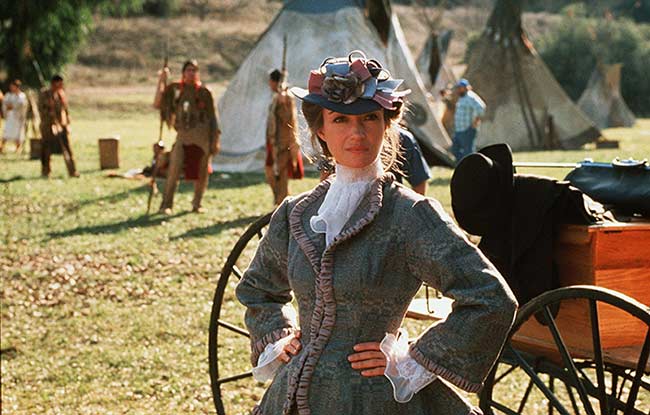
Dr. Quinn, Medicine Woman Review
When I was a little girl, my mom and sister and I had a time-honored Saturday night tradition. Saturday night was bath night. After we were both washed and had wet hair, we would sit on the floor while Mom put our hair in rag curls (so it would be curly the next day; honestly, I needed the rag curls more than my sister did), and watch Dr. Quinn, Medicine Woman together.
I loved Dr. Quinn, Medicine Woman. From the epic theme song, the dresses, the fact that she was a doctor, it was a Western, and, of course, Sully. Didn’t we all have a little crush on Sully? He was dreamy, he had a pet wolf and he was always fighting for what was right. It can’t have just been me, right? Of course, there was also social commentary and an epic (to me, at least) love story, making it, overall, a delightful show.
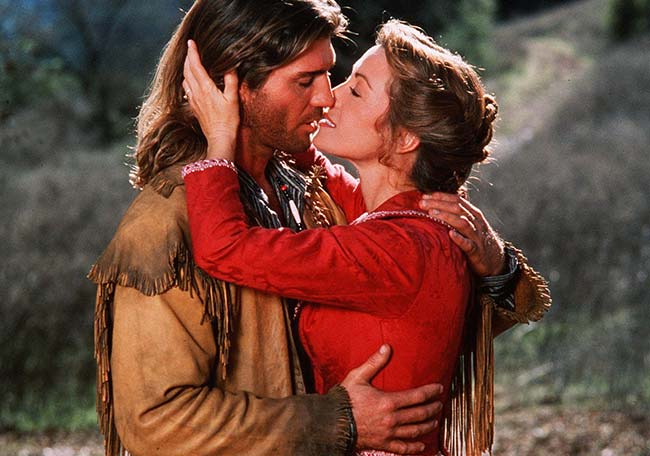
The show was created by Beth Sullivan and starred Jane Seymour as Dr. Michaela Quinn (Dr. Mike) and Joe Lando as Byron Sully. Dr. Quinn, Medicine Women followed the story of a female doctor from the Boston upper class working in Colorado Springs shortly after the Civil War.
Premiering in the US on January 1st, 1993, Doctor Quinn, Medicine Woman would run for five years and spawn two movies (Dr. Quinn, Medicine Woman: The Movie and Dr. Quinn, Medicine Woman: The Heart Within). While the movies premiered with mixed results to fans, they did tie up many of the loose ends from the series and give us more time with beloved characters.
The official synopsis of the show is that it focuses on “the trials and adventures of a female doctor in a small wild west town,” but really, it was about more than that. The show looked into the lives of the characters and portrayed people trying to live their lives while wrestling with issues that still resonate today, particularly racism and sexism.
As a kid, I didn’t really think about that too much; I was too excited by the story; but the basic premise of the show was that all people deserved to be able to live their lives as they saw fit, regardless of their race or gender. Additionally, everyone was entitled to the best medical care possible.
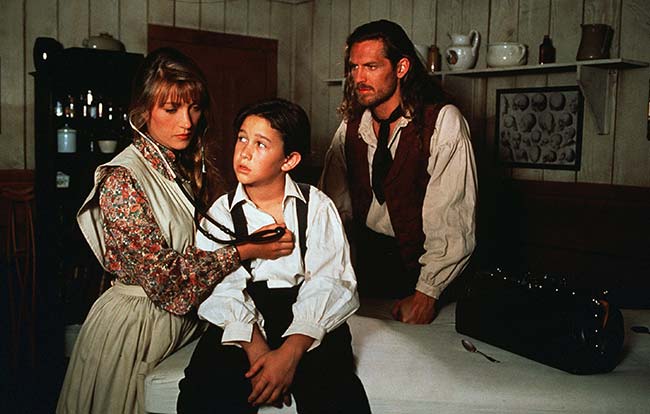
Sullivan and her writers were not afraid to tackle tough issues and the majority of the show deals with racism (particularly toward the Cheyenne and the African American residents of the town) and sexism, adding in historic events as well. Although some issues were moved around location-wise and historical characters were added in where they maybe shouldn’t have been, the spirit of those events remained intact.
One of the most traumatic episodes of the series is the Season Three two-part episode, Washita, which is about the Battle of Washita River. While in the show the massacre occurred in 1869 and was in Colorado, in reality it was actually something that had happened in Oklahoma a year earlier.
Regardless, it was one of those episodes that wiped out an entire village of characters that viewers had grown to care about over the last three seasons. I remember that episode, and I remember crying like a baby when I realized Snow Bird and all these other innocent characters that I loved were dead. Learning that that was based on true events made it even worse.
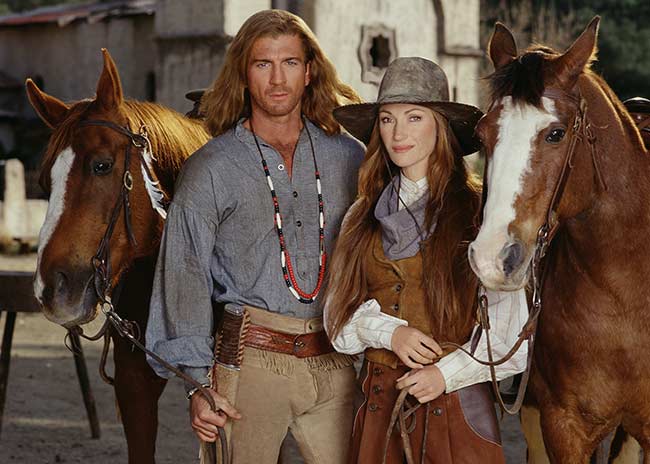
As the show progressed, they touched on a lot of issues. As a kid, I remember being angry during the KKK episode (Robert E and Grace were their friends!), being afraid of the Dog Soldiers but being able to see where they were coming from (a band of militant Cheyenne who had decided violence was the best solution), and hating Custer whenever he rode into town.
Here’s a brief series rundown. After the death of her father and business partner, Michaela is determined to continue working in the career that does not accept her, despite her mother’s wish for her to just settle down. Michaela’s upbringing as a wealthy young woman from Boston by at least one open-minded parent clearly affects her feelings on the social and political issues of the day.
The people of Colorado Territory are just as skeptical of Michaela’s credentials as a doctor as the people in Boston were. The people are reluctant to let her work on them, but she is determined to do the work she has been trained to do. She finds allies in Charlotte Cooper, the local midwife and owner of a boarding house, and in reclusive Mountain Man and friend to the Cheyenne, Byron Sully.
By the end of the pilot episode, Michaela has been accepted by the town (begrudgingly, but they have accepted that she’s not going away anytime soon), adopted the three children of her recently deceased friend Charlotte Cooper, found a place to live, struck up an unusual friendship with Byron Sully that will blossom into love over the course of the series, discovered for herself the horrible way that the Cheyenne are treated and found herself determined to stand up for their rights however she can, saved the life of Cheyenne Chief Black Kettle and gained her Cheyenne name, Medicine Woman.
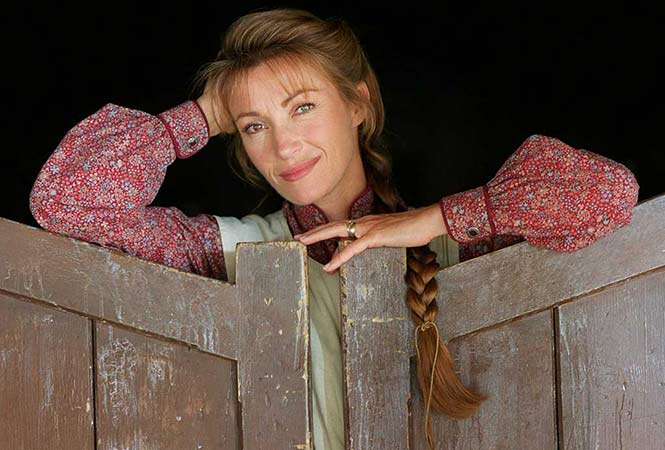
I read some criticisms of the show recently, focusing on how unrealistic it was. This popped up mainly because they were able to solve issues of racism, poverty, and heartbreak in one sixty minute episode, but I think that’s unfair (plus, sometimes two episodes were needed, it was covered in the arc of a season or was a recurring theme throughout the show). While it’s true that these things cannot be solved at the drop of a hat, and often times Michaela inadvertently made things worse, at the end of the day, the town was united in creating a better world for themselves and their children and came together anyway. These critics also missed the point: it wasn’t just about reality, the show was about lifting the spirits.
While you could argue that Dr. Quinn, Medicine Woman tackled more issues than the typical Western and tried to stay as close to historically accurate as possible, it was a Western that aired in the 90s. Not that that’s bad, but typically we don’t watch Westerns to see the bad things in our world triumph. In the classic sense, good wins out over bad, and the lines are clearly drawn. The bad guy goes to prison and the rain comes to save the crops. Reality can be hard, and I think that’s part of why the Western is so popular. They can solve all the world’s problems in an hour, sometimes two.
The portrayal of the Cheyenne is different than typical Westerns, mostly because the show was focused on pointing out racial inequality and trying to be historically accurate. Bonnie Paradise, who was at the time the director of the American Indian Registry for the Performing Arts in Hollywood (a group that campaigned for Native Americans to be cast as Native Americans and offered guidance on correct portrayals of living peoples, if I understand correctly), served as an adviser for the show.
Dr. Quinn, Medicine Woman does not shy away from pointing out the unpleasant (to put it mildly) interactions between the Cheyenne and the newcomers. The writers try to show that the West was changing and as it did, so did the town. All the people had to grow and adapt as the series progressed, and they all did. Dr. Quinn did, however, blur the lines a bit in that no characters were just bad or good. The Dog Soldiers had a reason for doing what they did (even if I didn’t agree with the execution), and the Army wasn’t just shown as brutal monsters. They were all people who sometimes made mistakes, and that made the show better.
I loved this show as a little girl because it wasn’t just a period drama with social commentary. I loved the Western setting, the fact that Dr. Quinn was a female doctor who wasn’t afraid to stand up for what was right, and I loved the love story. Michaela and Sully had great chemistry from the get-go, and watching their relationship slowly progress and build over the seasons was great.
They first see each other when Sully is translating at a peace conference and Michaela, having just arrived in town, falls on her face in the mud. They become friends and allies, fighting for the rights of the Cheyenne, and eventually get married. As a couple, they work. They’re both passionate about doing the right thing, they both have strong convictions that everyone is equal and deserves to be treated fairly, and they both are willing to fight for both that conviction and each other. And I remember being so excited when they finally got married!
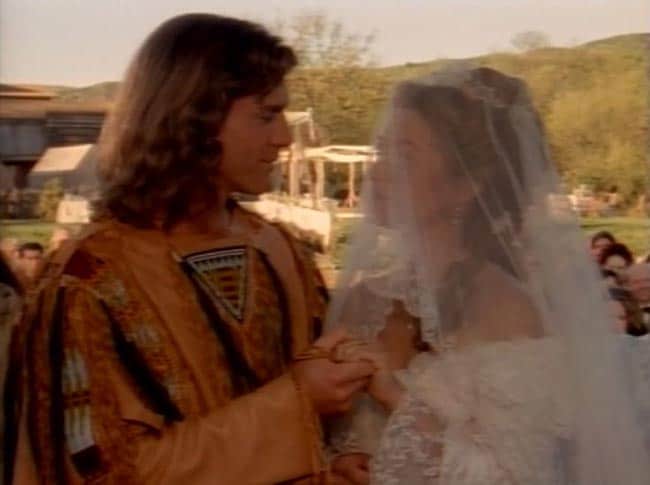
As the series progresses, Michaela learns how she can make a difference in the place she finds herself, and she does. Whether or not you agree with the way she tries to solve the world’s problems (often single-handedly), you can’t deny that she tries.
The romance between the leads, the family conflicts and the struggles that the town goes through are believable, and, even though everything gets wrapped up within an episode (and sometimes a season), the stakes feel real. Basically, with all six series available for streaming on Amazon (free with Amazon Prime), this is a wonderful series to binge-watch (or watch like a normal person, whichever you prefer) over the holiday season. Once you start watching this nostalgic classic, you might just be sucked in.
OVERALL RATING
“The stuff dreams are made of”
ROMANCE RATING
“You pierce my soul. I am half agony, half hope. I have loved none but you.”
Do you have nostalgic memories of watching Dr. Quinn, Medicine Woman? Did you like it? Let me know in the comments!
Photos: CBS
ARE YOU A ROMANCE FAN? FOLLOW THE SILVER PETTICOAT REVIEW:
 Our romance-themed entertainment site is on a mission to help you find the best period dramas, romance movies, TV shows, and books. Other topics include Jane Austen, Classic Hollywood, TV Couples, Fairy Tales, Romantic Living, Romanticism, and more. We’re damsels not in distress fighting for the all-new optimistic Romantic Revolution. Join us and subscribe. For more information, see our About, Old-Fashioned Romance 101, Modern Romanticism 101, and Romantic Living 101.
Our romance-themed entertainment site is on a mission to help you find the best period dramas, romance movies, TV shows, and books. Other topics include Jane Austen, Classic Hollywood, TV Couples, Fairy Tales, Romantic Living, Romanticism, and more. We’re damsels not in distress fighting for the all-new optimistic Romantic Revolution. Join us and subscribe. For more information, see our About, Old-Fashioned Romance 101, Modern Romanticism 101, and Romantic Living 101.

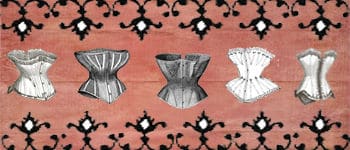

What a great post. Oh, the nostalgia… Like you write, for me and my family watching Dr. Quinn was also a family activity, every Saturday evening and even my father would often watch along! And yes, I also had a crush on Sully!
Now you’ve gone and made me want to rewatch this… And I don’t have the time…
Thanks for commenting, Birdie! I think someone in production made a really smart choice putting Dr. Quinn in that particular time-slot!
Yeah, I noticed when I started rewatching, I got sucked right in. It’s just so compelling…
I am currently rewatching the entire series and have learned something extraordinary. During the original airing, I admired Michaela, thought she could do no wrong, backed her every move. She was strong, fair-minded, chose her battles carefully and fought them honorably. Now, some 25ish years later, 90% of the time, I don’t like her character. She is willful, always forcing HER own way onto others, she was hypocritical, often taking a position in an argument but doing exactly the opposite a few episodes further down the road, a BIG problem is her ability to lie covering up the truth, all the while preaching that honesty is the best policy (her hypocrisy), she constantly meddles in the business of others all too often creating more problems than she solves, or making a difficult situation impossible. I find I’m more often than not urging her to back down, to stop and think before she speaks, or not to act at all, knowing what trouble she is going to create… I think my change of heart has everything to do with the 25 years I’ve had to grow and mature, to no longer take things at face value and recognize that there are any number of ways to tackle a problem and still avoid conflict or hurting innocent people – I don’t blindly believe in everything she does – a huge difference over such a short period of time…but the series is still as great as it was the first time around.
That’s a really great point! I know what you mean, there were times watching as an adult that I was surprised at how almost naive she is (though I think she did everything with good intentions). But like you said, it’s a great show even with that 🙂
Perhaps you just forgot your youth, got lost in reality and abandoned dreams and courage to be marvelled
You could see this writing as intentional. She comes from a rich family, is educated and well spoken. These advantages makes you sometimes forget that your point of view isn’t universal. She is entitled herself in someway. This could be the reason she has good intentions, but seem te
* but seems to create more problems than she solves.
My feelings totally and exactly!!!
Sandy Pinto
I also watched Dr. Quinn when I was young with my family each week. I’ve been re-watching the series and just finished the Washita episode and cried my eyes out! The scene where Dr. Mike screams in the barn was so heart wrenching. All the more so, because of the truth behind the episode. I agree with all you said, and yes, we all love Sully! Thanks for writing this review.
Maybe they will produce a TV movie about Dr. Quinn in the 21st Century, in the modern era.
During Covid 19! Or Dr. Quinn in
Outer Space. Or maybe Dr. Quinn is the towns Drug Dealer!